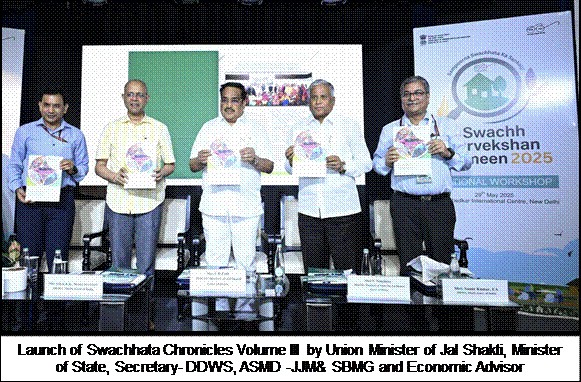Swachh Survekshan Grameen (SSG) 2025

- 31 May 2025
In News:
The Union Minister of Jal Shakti recently launched Swachh Survekshan Grameen (SSG) 2025, India’s largest rural sanitation survey, conducted by the Department of Drinking Water and Sanitation (DDWS) under the Ministry of Jal Shakti.
Objective and Scope:
SSG 2025 is designed to evaluate the impact and sustainability of rural sanitation outcomes achieved under the Swachh Bharat Mission – Gramin (SBM-G) Phase II, particularly focusing on the Open Defecation Free (ODF) Plus Model.
- The survey aims to rank all States, Union Territories, and Districts based on both quantitative and qualitative sanitation indicators.
- 21,000 villages across 761 districts in 34 States/UTs will be covered.
Key Assessment Components:
The evaluation follows a structured framework with four major components:
- Service-Level Progress (SLP): Based on data from district self-assessments and verification of ODF Plus Model villages.
- Direct Observation of Sanitation Status: Field-based observations in sampled villages, households, and public places such as schools and Common Service Centers (CSCs).
- Infrastructure Functionality Check: Includes assessment of:
- Plastic Waste Management Units (PWMUs)
- Faecal Sludge Management (FSM) plants
- GOBARdhan plants
- Swachhata Green Leaf Rating (SGLR) sites
- Citizen Feedback: Collected through a dedicated mobile application and direct interviews, ensuring community participation and transparency.
Key Innovations in SSG 2025:
- Geo-fencing for data authenticity and integrity.
- Emphasis on Jan Bhagidari (public participation) to sustain and validate sanitation achievements.
- Engagement of an independent agency for unbiased survey implementation.
- Launch of Swachhata Chronicles Volume III and a compendium of best practices from States to promote knowledge sharing.
Significance:
- Reinforces India’s commitment to sustainable sanitation and rural development.
- Encourages evidence-based policy interventions and fosters competitive federalism.
- Highlights sanitation as a continuous developmental journey, not a one-time target.
